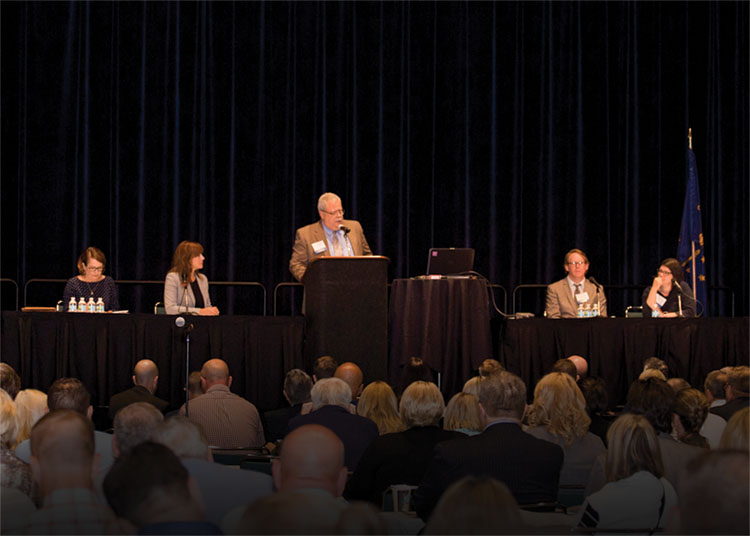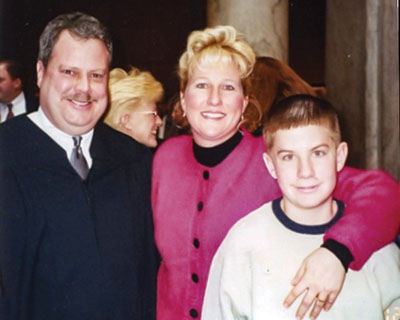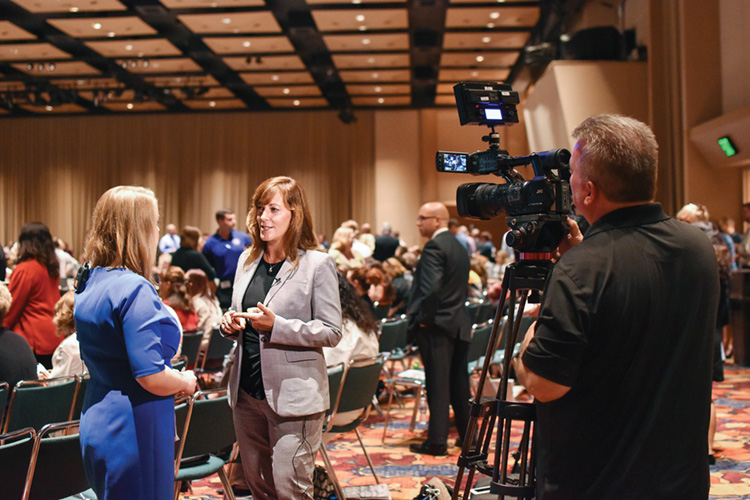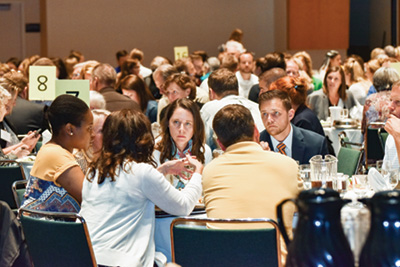
By Kathryn Dolan, Indiana Supreme Court Chief Public Information Officer and Haley Loquercio, Intern, Office of Communication, Education, and Outreach
Indiana Leaders Work Toward Recovery
The Statewide Opioid Summit began with nearly 1,000 audience members hearing a devastating 911 call that brought the training into quick focus. One Summit attendee sadly explained, “It’s easy to talk about overdose and addiction. But when we have a face or a voice to attach to the issue, it’s a completely different situation.”
The voice that pushed the crisis away from anonymity was that of a panicked mother talking to emergency dispatchers as her son died:
Kristina Nelson: “I need an ambulance, my son’s not breathing.”
911 Operator: “Is he blue?”
Kristina Nelson: “He’s… he’s white… Ohhh God, he is dead!”
Bill Nelson, taking over the phone call: “He is 20 years old, get someone over here.”
911 Operator: “Has he taken anything?”
Bill Nelson: “We don’t know. He’s… he has in the past.”
Bill Nelson, who took over the phone from his distraught wife, is a Marion Superior Court Criminal Division Judge. He made the 911 call 10 years ago, but the grief of losing his stepson is still present. Judge Nelson played the call during his remarks at the summit. While he had never spoken to such a large crowd, Judge Nelson noted, “I reach out or touch somebody and share this story at least once a day in the courtroom because the issue is so prevalent.”
The Opioid Summit was a chance for even more widespread outreach, and his willingness to open-up about such a personal story helped define the day. One attendee who submitted a written evaluation of the program said, “The strong story grabbed my attention and reminded me why I was at the event.”

The Event
The Statewide Opioid Summit: Medication Assisted Treatment and Addictions Primer for Justice Professionals took place on July 25. The Indiana Supreme Court, Indiana Family and Social Services Administration, Indiana University Grand Challenges, and the Association of Indiana Counties worked together to sponsor the one-day event held at the Indiana Convention Center in Indianapolis.
Professionals who play different roles in the Indiana justice system attended the Summit. Union Circuit Court Judge Matthew Cox stated, “I am impressed by not only the number of people here, but the different types: judges, prosecutors, public defenders, probation officers, county and state police, and correctional officers.”
Wayne County Prosecutor April Drake added, “I am here to get a different perspective than what I usually see in the courtroom.”
Chief Justice Loretta Rush, who is also the co-chair of the National Opioid Judicial Task Force, explained why it was important to have county teams that included a variety of justice professionals. “The opioid crisis requires all hands on deck. From the initial 911 call to getting someone back into the community, a person struggling with addiction interacts with many levels of justice professionals, and it is important that everyone becomes educated on best practices to handle the issue.”
Understanding Addiction
Education focused on opioid use disorder (OUD) and medication assisted treatment (MAT), as well as the evidence that underlies treatment types, best practices, and legal implications. The Sequential Intercept Model (SIM) served as the focus of the working lunch.
“The training was geared toward understanding the importance of MAT and that it isn’t simply substituting one addiction for another,” said one participant in an evaluation. Another echoed the statement reiterating, “The presentation included a breakdown definition of the brain chemistry and the disease of addiction.”
MAT combines the use of counseling and behavioral therapies with Food and Drug Administration approved medications to treat opioid use disorders. Eric Wood, a case manager with the Judges and Lawyers Assistance Program, remarked, “I am excited about MAT because it gives a chance we have never seen in recovery. It gives a person the chance to recover their life, work, family, and finances.”
Dr. R. Andrew Chambers from IU Medicine spoke about “the importance of understanding all aspects of addiction: biological, neurological, behavioral,” as well as the prevalence of addiction, stating “One in five people have this neuropsychiatric disease of addiction.”
Discussion of the Challenges
The Summit sparked discussion. Participants did not shy away from the extremely difficult challenges associated with solving such a complex problem. In person and in evaluations submitted to organizers, participants pointed out concerns:
- “I am in a small county with few resources. Most of my offenders I supervise who are on opiates have no job or mode of transportation. The nearest clinic is over an hour away. MAT is difficult for my situation. We do try to follow MAT but only those who can get to the medications can take advantage of it.”
- “Over-crowded jails and probation officers with caseloads of 100+ clients aren’t effective at this level. Specialized courts and probation officers, jail intervention programs, and consistent recovery management following incarceration is a must.”
- “There is a lot more to this crisis then just addressing the addiction. There are other basic needs of these patients that have to be met such as food, shelter, and transportation. But the real roadblock comes on the side of how do we fund these programs?”
While all the thoughtful questions posed at the Summit could not be answered in one day, the collaborative nature of the Summit ignited action. Wabash County Chief Probation Officer Sarah Lochner explained, “We are fortunate to have a reliable and responsible MAT provider in our community, and they already work diligently to collaborate with us. Now we will create a committee on our Advisory Board to solve some of the issues we have implementing MAT in our jail. We had a long overdue conversation with our jail medical provider and our hospital foundation about MAT. The Summit was the catalyst!”

Media Coverage
The sponsors began the day with a press availability to discuss the important conversations surrounding opioid use. Dozens of media outlets from Indiana and Kentucky attended the event. More than 35 features ran in local newspapers, online, and on television stations:
- “In the room, more than a thousand people are on the front lines in the battle against opioid abuse … all with the power to make a change.” –WRTV 6, Indianapolis
- “The team members resolved to take the knowledge learned at the conference and put it to use in dealing with drug abusers in Randolph County.” – The News-Gazette, Winchester
- “Fort Wayne Police Department’s vice and narcotics captain Kevin Hunter will be in attendance looking for solutions. ‘Treatment is really one of the lacking areas that we need to do better at here in Allen County,’ he explained.” –WANE TV, Fort Wayne
- “Local officials are constantly getting training and more information, in the hopes to help those addicted to the opioids. That is the reason a [Dubois County] team is going to the state summit, ‘We are trying to do our best to address this,’ she [Chief Probation Officer Jenny Lampert] said. ‘People are dying from this — and that’s permanent.’” –Dubois County Herald, Jasper
- “In Clark County, the Family Drug Treatment Court does not use much medication-assistance and that’s one reason the county sent a team of people to learn more about what it is and what it does.” –WLKY, Louisville, KY

Hope for Recovery
The day-long Summit began with a heavy hearted 911 call, but the closing session provided hope for recovery. The final speaker of the day was Brandon George, Executive Director of the Indiana Addictions Issues Coalition. He is on the advisory board for Indiana’s Division of Mental Health and Addiction, the Expert Panel of Indiana University School of Medicine’s Project ECHO, and is the committee chair of the Indiana Attorney General’s Office Drug Task Force.
While professionally accomplished, the powerful nature of Mr. George’s remarks did not stem from his work expertise, but rather his life experiences. He conveyed his struggles and accomplishments as a person in long term recovery from substance use disorders. “I have all these titles but none of those come close to my ability to be a good father, husband, son, and a good person now. That is what I am most proud of – it is possible now that I help people and help the recovery process.”
“While we have lots of evidence that addiction is a brain disease, to reduce stigma, nothing really shifts perspective from negative to positive like a personal connection and sharing their story.” Mr. George began his road to recovery like many others, in a moment of hopelessness and isolation. He explains that he shares his story because “it is proof that recovery is possible and treatment works.”
While devastating 911 calls like the one made by Judge Nelson and his wife still occur too often in Indiana, the Summit’s closing message showcased the continued need to strive to improve the recovery process for Hoosiers affected by the disease of addiction. The uplifting spirit of the day culminated in a standing ovation for Mr. George who left the audience with proof that recovery works.